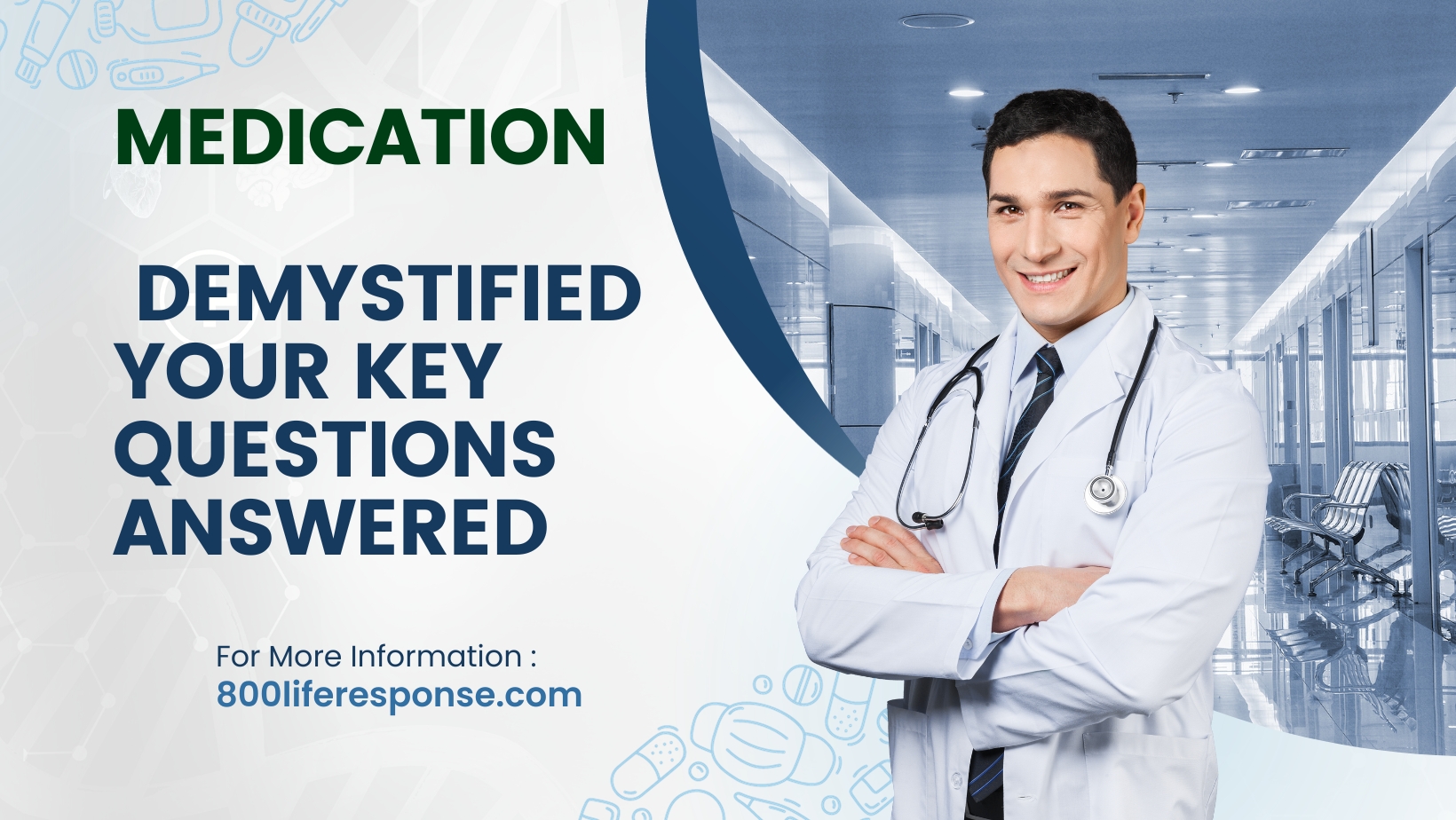Medication Demystified: Your Key Questions Answered
Introduction
Millions of people’s lives are improved and a multitude of diseases are relieved thanks to medications, which are essential to contemporary healthcare. But for many people, the world of medication may be overwhelming and complicated, leading to a lot of questions and worries. By answering some of the most frequently asked questions, we hope to shed light on the world of pharmaceuticals. We’ll explore the key elements that can enable you to make knowledgeable decisions about your health, from understanding how pharmaceuticals function to managing potential side effects.

-
How do drugs function?
Depending on what their intended use is, medications can have a variety of effects. Medication is created to specifically interfere with the physiological processes that occur in the human body, which is a complex system. For example, analgesics such as acetaminophen or ibuprofen function by inhibiting pain signals, but antibiotics specifically target and eradicate microorganisms that cause illnesses. How drugs provide the intended therapeutic effects can be clarified by understanding the underlying processes.
-
Do generic drugs work just as well as name-brand drugs?
The apparent efficacy of generic drugs in comparison to their name-brand equivalents is a frequent misunderstanding. In actuality, regulatory bodies put generic medications through a thorough testing process to make sure they are bioequivalent to the original name-brand medication. Generic medication is typically less expensive due to lower marketing costs, which is the main distinction. To choose the best course of action for your unique situation, it’s crucial to consult with healthcare specialists.
-
What Are Medications’ Typical Side Effects?
All drugs have potential side effects, even when their intended purpose is to treat or reduce symptoms. These can range greatly in severity, from minor to major responses. It’s crucial to be aware of any potential negative responses, and common side effects include tiredness, nausea, and dizziness. Always read the medication information sheet that the pharmacist gives you, and notify your healthcare practitioner right away if you experience any odd symptoms.
-
How Can I Handle the Side Effects of My Medication?
Open communication with healthcare practitioners is essential to managing the side effects of medication. Consult your doctor before stopping any medication if you encounter negative side effects. They could change the medication’s dose, suggest ways to lessen side effects, or switch to a different one. Furthermore, lifestyle adjustments, including dietary or exercise adjustments, might occasionally lessen side effects.
-
Are there any interactions between medications?
The concurrent use of many drugs, or polypharmacy, might raise the possibility of drug interactions. Some drugs can increase or decrease the effects of others, leading to unanticipated consequences. To avoid potential interactions, it is crucial to let your healthcare professional know about all of your prescriptions, including OTC medications and supplements. Additionally, pharmacists are crucial in spotting potential drug interactions and offering advice on how to take medications safely.
-
Is Taking Medicines Safe During a Pregnancy?
Concerns over the safety of drugs during pregnancy are frequently voiced by expectant mothers. Many drugs are safe when used as directed by a healthcare expert, despite the fact that some may have side effects. It’s critical to be transparent with your healthcare provider about your pregnancy or intended pregnancy. When appropriate, they might suggest alternative therapies or modify medication based on an assessment of the risks and benefits.
-
How Do Medication Prescriptions Affect Personalized Medicine?
Personalized medicine, which evaluates a person’s genetic composition, lifestyle, and other aspects to customize medication prescriptions, has been made possible by advancements in medical research. The goal of this developing profession is to minimize side effects while increasing therapy efficacy. Personalized medicine has the potential to transform the way pharmaceuticals are given and administered as our understanding of genetics and disease causes advances.
-
How can I guarantee medication compliance?
It is crucial for patients to follow their recommended medication schedules. Obstacles to adherence include forgetfulness, worries about side effects, and the price of medication. Improved adherence can be achieved by implementing techniques including pill organizers, medication reminders, and communication with healthcare practitioners. Finding solutions that work for you and resolving any issues you may be having requires open communication between you and your healthcare team.
-
What Happens If I Take Too Much Medicine?
It is crucial to act quickly in the unfortunate case of a medication overdose. Make quick contact with emergency services and let them know about the medication you consumed. Remember to refer to the medication box and heed any directions given by emergency personnel. Inform yourself and those close to you about the warning symptoms of medication overdose, since prompt medical attention can save lives.
Do herbal supplements have side effects?
Despite being thought of as natural and harmless, herbal supplements have the potential to interact with pharmaceuticals and have pharmacological effects. Given that supplements may affect the effectiveness and security of prescription drugs, it is crucial to disclose any supplements to healthcare practitioners. Herbal supplements are still being researched, so before adding them to your routine, you should speak with a healthcare provider about the risks and potential benefits.
In summary
Making sense of the world of pharmaceuticals can be difficult at times, but the first step to taking control of your health is gaining information. You may maximize the benefits of pharmaceuticals while lowering the risks by understanding how they operate, being aware of potential medication side effects, and actively interacting with healthcare professionals. Accepting the idea of individualized treatment and being watchful of medication compliance increases people’s ability to take charge of their health. In this journey, keep in mind that your healthcare team is your ally, offering support and direction to make sure that your drugs enhance your general health and energy.
